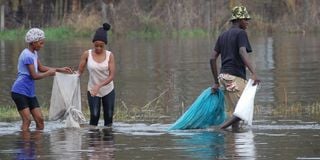Fishermen flock to Lake Nakuru, but their catches raise big stink

Residents of Barut in Nakuru on a fishing expedition in Lake Nakuru water that has spilled to their residential areas in this July 2020 photo.
What you need to know:
- Researchers raise concerns over the quality of fish harvested in Lake Nakuru.
- Fishmongers have complained that the fish rots quite fast.
At the end of last year, Cleophas Olando joined at least 500 fishermen on a fishing expedition in Lake Nakuru.
The fishermen were making a killing from a venture that is yet to get the nod from the relevant authorities.
To contextualise the gains made by the fishing folk, Mr Olando, who moved to Lake Nakuru late last year, was able to make a cool Sh60,000 a day.
“The business was booming and the returns were good... we used to earn handsome returns from the fishing activities,” he told the Nation.
The fishing, he disclosed, was being carried out in private farms near the game park, but recent concerns over the quality of the fish have seen them being blocked from accessing those areas.
“We have been blocked from going to fish after researchers raised concerns over the water quality,” added Mr Olando.
He described the fishing opportunity as a “godsend” with the majority of those involved earning huge returns.
“We used to sell the fish in Nakuru, Nairobi, Kitale and Kisumu, where we enjoyed a ready market,” added Mr Olando.
Illegal fishing
Fishmongers have also erected semi-permanent structures on a hired farm, where they prepare and sell ready-to-eat fish meals to clients.
“We have had an influx of lake operators moving to Nakuru from Naivasha,” said seasoned fisherman David Kilo.
With the fisheries department tightening the screws on illegal fishing activities in Lake Naivasha, the majority of the unlicensed fish operators moved to Nakuru in search of greener pastures.
But with results of the tests being awaited, Mr Kilo called for speedy analysis of the samples, saying the industry was a source of livelihood for hundreds of young people.
“The preliminary report by the research body has scared a majority of the fishmongers and it is only prudent to clear doubts about the quality of fish species caught in the lake,” he added.
Nakuru Public Health Director Elizabeth Kiptoo said they were waiting for conclusive reports from the government chemist, before taking “necessary measures”.
“We shall, definitely, enforce the obligatory laws after the results from the samples taken to the government chemist are out,” Dr Kiptoo told the Nation.
She stated that they were working with the county’s food and security committee members to address the situation.
Quality of fish
According to the Chief Officer for Livestock and Fisheries, Dr Enos Amuyunzu, the samples were taken for examination early in the year.
Researchers have raised concerns over the quality of fish harvested in Lake Nakuru, describing the various species as not safe for human consumption.
Fishmongers have also expressed complained about the quality of the fish, which they claimed was rotting within hours of caught.
Scientist and lead researcher George Morara called for in-depth research to establish whether the fish is fit for human consumption and also investigate the levels of contamination, especially of heavy metals in the fish tissue.
“I will be wary to eat fish from Lake Nakuru given that the species are being harvested from unregulated water bodies,” he said.
A study conducted by Kenya Marine and Fisheries Research Institute indicates high nitrate levels.
An alkaline water mass, Lake Nakuru was for many years inhabited by a small Cichlid fish, which can tolerate harsh conditions. The fish was introduced in the early 1960s and has flourished in the lake.
Safety measures have also been brought into the fore after a 19-year-old fisherman drowned on Sunday night at Baruti area on the periphery of the lake.
The victim was in a group of three others who encountered strong winds when the incident occurred in the dead of night.
Machariamwangi2008@gmail.





